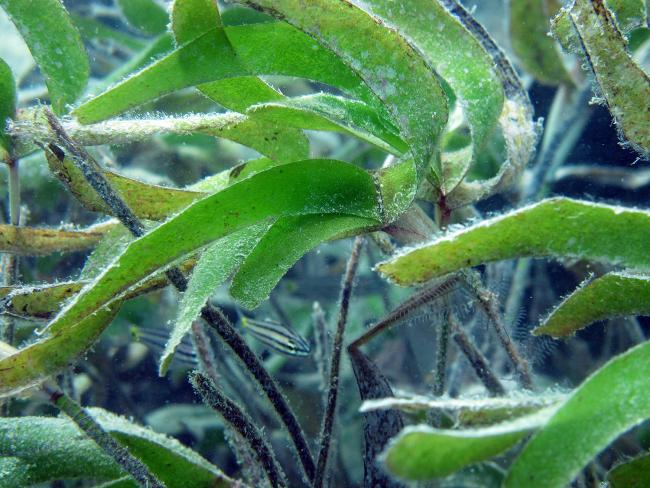Shallow water coastal systems are inhabited by marine benthic primary producers that provide critical habitat and food for many marine organisms. Seagrasses and macroalgae offer stabilization of sediments and protection against erosion and turbidity, and enhancement of biogeochemical processes including oxygen production, carbon sequestration, and nutrient filtration and cycling.
However, local and global environmental changes are rapidly increasing, leading to increased nutrient and sediment inputs, reduction of consumers, and increased temperature and ocean acidification which may impact these shallow water coastal systems. As research examining impacts of environmental change on seagrasses and macroalgal shallow water systems focuses primarily on temperate latitudes, major knowledge gaps exist on functioning of tropical systems. This project, funded by the DFG, aims to understand tropical shallow water seagrass and macroalgal community dynamics and performance under changing environments by:
1) determining temporal and spatial distribution, abundance, and biodiversity of seagrass and macroalgal communities in relation to different environmental parameters
2) examining biological and physiological responses of seagrasses and macroalgae to abiotic and biotic stressors and competitive interactions between them
3) using a trait based approach to predict seagrass and macroalgal community dynamics and ecosystem consequences under environmental change
These goals will be realized through intensive field studies on seagrass and macroalgal shallow water communities in two tropical sites Bocas del Toro, Panama in the Tropical Atlantic seagrass bioregion, where seagrass diversity is low, and Zanzibar, Tanzania in the Tropical Indo-Pacific where seagrass diversity is high. Within these sites, subsites will be selected that are exposed to different environmental conditions of nutrients, light, climate and temperature variability, and grazing pressure. In parallel, controlled laboratory and mesocosm experiments will be carried out at the field sites and at the Marine Experimental Ecology laboratory (MAREE) at the home institution, ZMT, Germany. Values of characteristic morphological, physiological, biochemical, and life history traits of seagrasses and macroalgae will be analyzed along environmental gradients using a trait based approach to link traits to ecological functions and to the environment, and to determine trade-offs among traits.
Project Partners (Germany) |
International Project Partners | |
|---|---|---|
|
Prof. Dr. Agostino Merico, Systems Ecology, Leibniz Centre for Tropical Marine Research (ZMT) Prof. Dr. Peter Schupp, Institute for Chemistry and Biology of the Marine Environment, University of Oldenburg |
Tanzania Dr. Matern Mtolera, Institute of Marine Sciences, University of Dar es Salaam, Zanzibar, Tanzania
|





